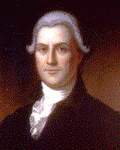 |
Samuel Huntington
b. 5/16 Jul 1731, Windham, Connecticut [1]
d. 5 Jan 1796, Norwich, Connecticut |
| Title: |
President of Congress |
| Term: |
28 Sep 1779 - 10 Jul 1781 |
| Chronology: |
28 Sep 1779,
elected to the office of the President of Congress, session of Congress, State House, Philadelphia, Pennsylvania [2] |
|
6 Jul 1781, submitted a request for leave of absence, session of the Congress, State House, Philadelphia, Pennsylvania [3][4] |
|
10 Jul 1781, ceased to exercise the duties of office upon the election of a successor, session of the Congress, State House, Philadelphia, Pennsylvania [5] |
| Biography: |
| Son of a farmer who was one of the original settlers in the town of Windham; learned the trade of cooper; began studying in his spare time with the encouragement of the Rev. Ebenezer Devotion; was admitted to the bar in Windham (1754); moved to Norwich (c. 1760) where he commenced a law practice; served as a king's attorney (1765-1773); was elected as a representative of Norwich in the General Court or Assembly of the Colony of Connecticut (May session, 1765); appointed a justice of the peace in the county of New London (1765-1775) and a judge of the Connecticut Superior Courts (1773-1784); member of the Committee (Council) of Safety of Connecticut (1775-1776); elected an Assistant, a member of the Upper House of the General Assembly (1775-1784); elected a delegate to the Continental Congress (served in 1776, 1778-1781, 1783); was one of the signers of the Declaration of Independence (approved 4 Jul 1776); elected the President of Congress (28 Sep 1779), serving during a period of severe economic problems and military defeats, including the loss of Charleston, South Carolina (12 May 1780); was confirmed in office after a resolution passed by the Congress (28 Sep 1780) which recognised that "no rule or practice of the house limits the term for which the President is elected"; continued in office after the Articles of Confederation and Perpetual Union entered into force 1 Mar 1781; his request for a leave of absence (8 May 1781) was granted on condition that his successor would be elected 10 May 1781; as the Congress was continuously postponing the election, he submitted a notice that "his ill state of health will not permit him to continue longer in the exercise of the duties of that office" (6 Jul 1781) and stepped down 10 Jul 1781; served as Lieutenant Governor (13 May 1784 - 12 May 1786), Chief Judge of the Superior Court (1784-1785) and Governor of the State of Connecticut (12 May 1786 - 5 Jan 1796). |
| Biographical sources: Biographical Directory of the United States Congress (2005), 1305; "The Huntington Family in America: A Genealogical Memoir of the Known Descendants of Simon Huntington from 1633 to 1915" (Hartford, CT: Huntington Family Association, 1915), 543-550; obituaries in: The Norwich Packet, Thursday, January 7, 1796, vol. XXII, No. 1138, p. 3, col. 3; The Norwich Packet, Thursday, January 14, 1796, vol. XXII, No. 1139, p. 3, col. 3-4. |
| |
| [1] |
"The Barbour Collection of Connecticut Town Vital Records: Windham 1692-1850", ed. by Lorraine Cook White and Carole Magnuson (Baltimore: Genealogical Pub. Co., 2002): "Sam(ue)ll, s. Nath(anie)ll & Mehetabel, b. July 5, 1731; 1; 74"; see additional information (web site) |
| [2] |
Journals of the Continental Congress, 15:1114. |
| [3] |
Journals of the Continental Congress, 20:724. |
| [4] |
In response to the request submitted by Huntington, the Congress resolved "That Monday next be assigned for electing a president." The presence of Huntington at the sessions of 7 Jul 1781, 9 Jul 1781, and 10 Jul 1781, is not recorded in the Journals of the Continental Congress, but the letters written by Huntington suggest that he continued to exercise the duties of office until 10 Jul 1781 when Thomas McKean accepted election (Letters of Delegates to Congress, 17:386-389). |
| [5] |
Journals of the Continental Congress, 20:733. |
| |
Image: a portrait by George Wright after a painting made by Charles Willson Peale in 1783. |

